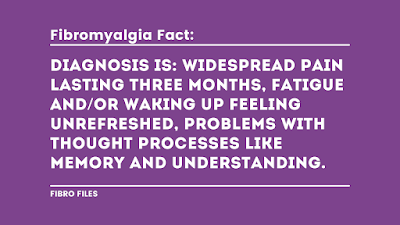These are random Fibro facts that I have collected over the years and shared on my twitter account.
I thought it would be good to put them altogether in one place
- Fibromyalgia is a disorder with widespread musculoskeletal pain, fatigue, and sleep and memory disturbance.
- Fibromyalgia (FM) is a medical condition characterised by chronic widespread pain and a heightened pain response to pressure.
- Fibromyalgia can cause significant pain and fatigue, and interfere with a person’s ability to carry on daily activities.
- The word fibromyalgia comes from the Latin term for fibrous tissue (fibro) and the Greek ones for muscle (myo) and pain (algia).
- Although fibromyalgia is often considered an arthritis-related condition, it is not truly a form of arthritis (a disease of the joints) because it does not cause inflammation or damage to the joints.
- Symptoms of Fibromyalgia most usually arrive between the ages of 35 and 45.
- Diagnosis of fibromyalgia use to be made on specific tender points in certain areas of your body. Now diagnosis is: widespread pain lasting three months, fatigue and/or waking up feeling unrefreshed, problems with thought processes like memory and understanding.
- Neurological symptoms of fibromyalgia include: dysfunctions of muscles, ligaments and joints; numbness, tingling; muscle twitching, muscle cramps, muscle weakness; headaches, generalised weakness, dizziness, and sensory overload.
- People with Fibromyalgia can be hypersensitive to external stimuli such as smells, lights and sounds.
- Fibro Fighters often suffer from abnormalities in reaching deep sleep.
- Fibromyalgia symptoms may change throughout the day while - for many 11 a.m. to 3 p.m. tends to be when they feel the best.
- Arthritis Research UK suggests that as many as one in every 25 people suffer from the condition in the UK!
- Fibromyalgia is a long-term (chronic) condition that can cause widespread pain and tenderness over much of the body. It's quite common – up to 1 person in every 25 may be affected. Arthritis Research UK.
- Fibromyalgia affects about 2 percent of people in the US by age 20, which increases to approximately 8 percent of people by age 70.
- Cognitive Fibromyalgia symptoms include: impaired concentration, short-term memory problems, inability to multi-task, slow mental performance, easily distracted, feeling overwhelmed, difficulty finding words.
- Disrupted sleep, insomnia, and poor quality sleep occur frequently in FM, and may contribute to pain by decreased release of IGF-1 and human growth hormone, leading to decreased tissue repair.
- Three medications are FDA-approved to treat fibromyalgia: Cymbalta (duloxetine) Lyrica (pregabalin) Savella (milnacipran)
- Non-celiac gluten sensitivity may be an underlying cause of fibromyalgia symptoms but further research is needed. A 2015 review revealed potential benefit of specific dietary interventions in FM
- Stiffness is part of Fibromyalgia - when we wake up or after sitting for long periods of time.
- The sensations of pain experienced by patients with fibromyalgia are thought to result from multiple levels in the central nervous system. (CNS) The CNS is part of the nervous system and consists of the brain and the spinal cord.
- Fibromyalgia should be considered as a diagnostic possibility in all cases of persistent, significant musculoskeletal pain, fatigue or sleep disturbance, particularly when such symptoms seem out of proportion to the severity of any background chronic illness. Guymer & Littlejohn
- It is estimated that about 10 million Americans have Fibromyalgia.
- Research has shown that people with Fibromyalgia who participated in gentle yoga classes experienced improved mood, less pain and fatigue.
- Fibromyalgia can be difficult to treat. Not all doctors are familiar with fibromyalgia and its treatment, so it is important to find a doctor who is.




Great list, Lee!
ReplyDeleteIt's really shocking when you see all the symptoms listed together...just shows how strong people living with fibro are x thanks for the list.
ReplyDeleteGood list. But it's be helpful to see symptoms that are often less talked about, other than pain and fatigue. Like heart palpitations, problems with temperature control, overactive bladder, balance issues. If it wasn't for those, I might be doubting I've had fibro since childhood, because until recently the pain would come and go (except headaches). But the 'lesser' symptoms have been with me for decades.
ReplyDeleteI really appreciate this list, can relate to all of the sxs, just need help finding a Dr in Hillsboro, OR, previously was with Dr Ginevra Liptan, she no longer takes Medicare pts.
ReplyDelete